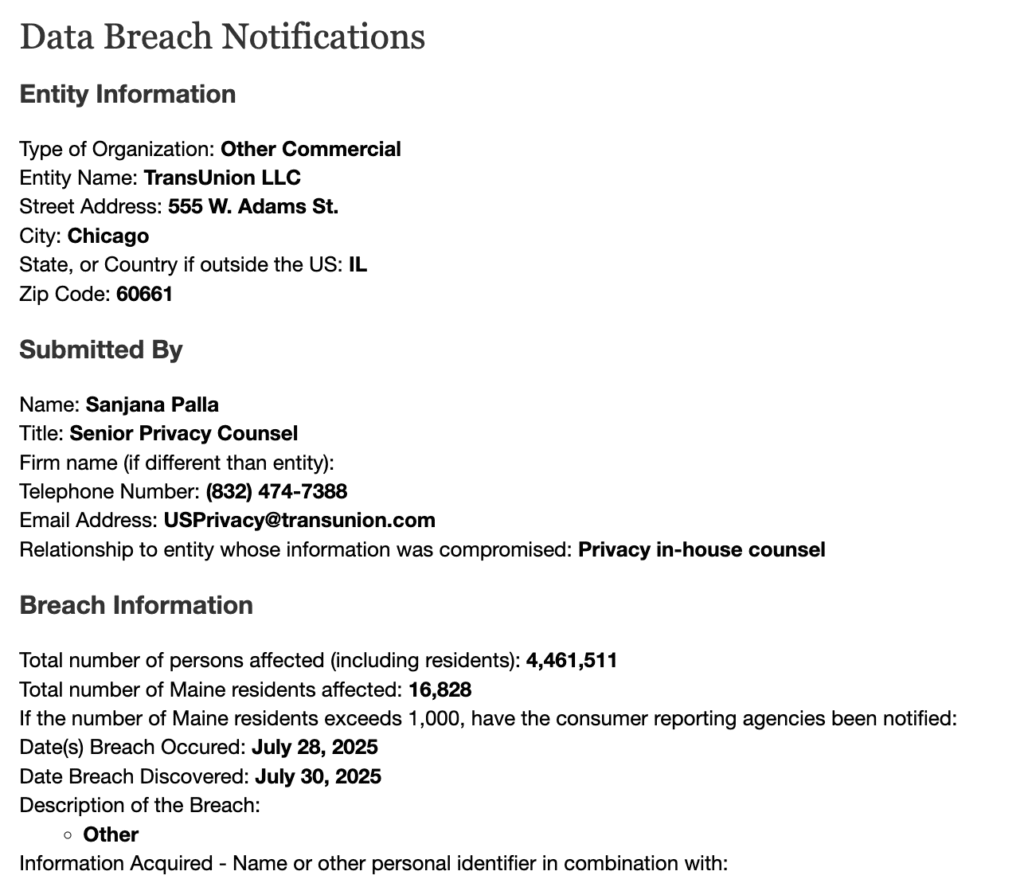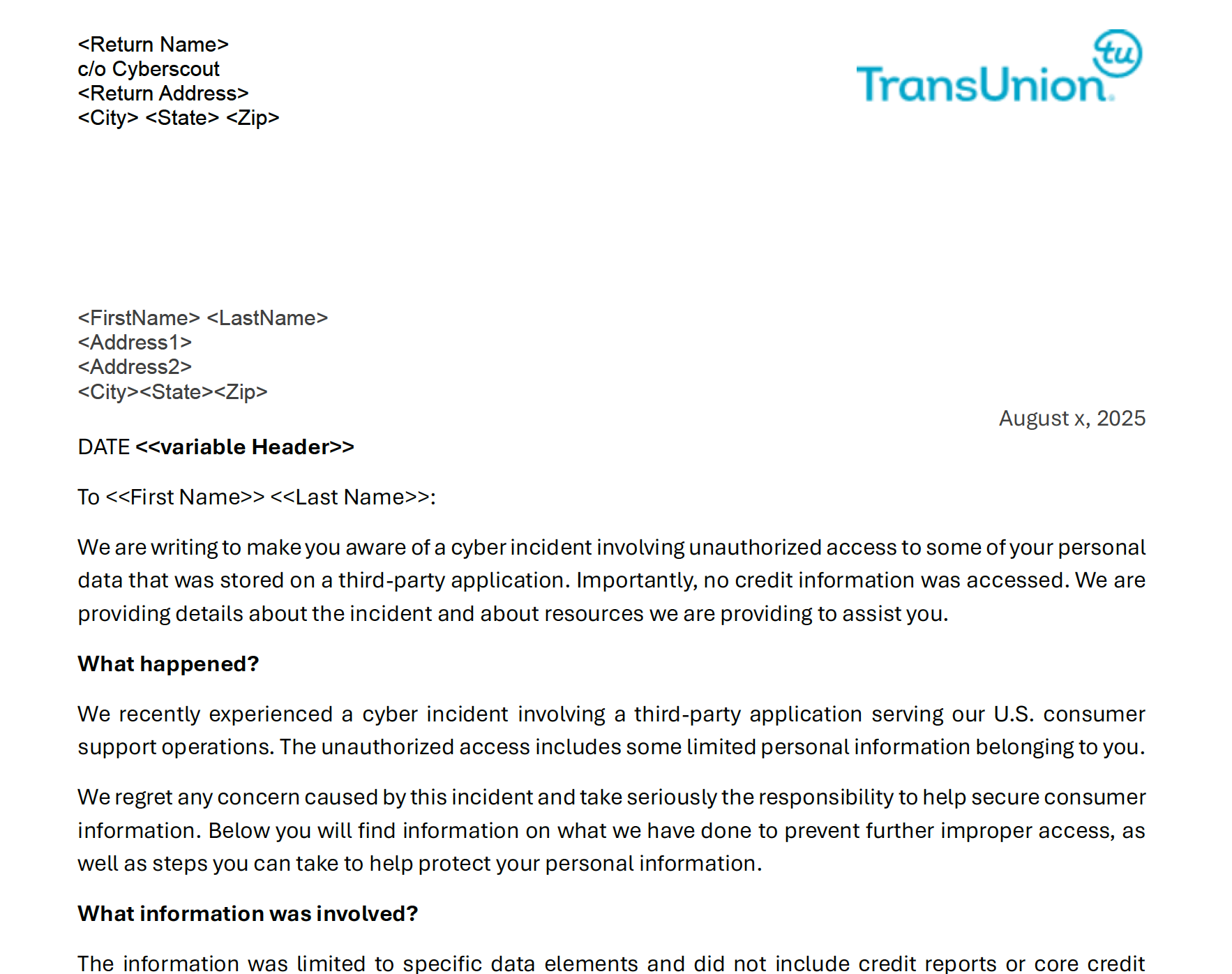Another week and another big name breach. Credit reporting giant TransUnion fell victim to a cyber incident that exposed the personal information of approximately 4.4 million U.S. consumers. The breach, which occurred on July 28 and was detected two days later, stemmed from unauthorized access to a third-party application used in the company’s consumer support operations. Unlike previous high-profile hacks, this one did not compromise TransUnion’s core credit database or full credit reports, but it still highlighted vulnerabilities in the interconnected web of third party data handlers that underpin the financial industry. This is yet another weekly wake up call for the data security industry showcasing the huge risks we live with having our data out there.
TransUnion Joins Experian in Data Privacy Issues
TransUnion, one of the “Big Three” credit bureaus alongside Equifax and Experian, disclosed the breach through mandatory notifications filed with state regulators, including a detailed letter posted on the Maine Attorney General’s website. The company acted swiftly to contain the intrusion upon discovery on July 30, isolating the affected system and launching an internal investigation. Notifications to impacted individuals began rolling out on August 26, offering free credit monitoring and identity theft protection services for two years as a remedial measure.
On the Maine AG website the data breach notifications look like this:

The compromised data included highly sensitive details such as names, dates of birth, and Social Security numbers—information that cybercriminals often exploit for identity fraud, loan scams, or phishing schemes. While the exact method of the hack remains undisclosed, experts speculate it involved exploiting weaknesses in the third-party vendor’s security protocols, a common vector in modern supply chain attacks. TransUnion emphasized that the breach was limited in scope, affecting only a fraction of its vast user base, but the sheer number of victims—over 4.4 million—underscores the scale of potential harm.
Public reaction on social platforms has been swift and critical, with users expressing frustration over the irony of a credit bureau failing to safeguard basic personal data. Posts on X (formerly Twitter) highlighted concerns about recurring breaches in the industry, drawing parallels to past incidents like the 2017 Equifax hack that affected 147 million people. One user quipped about the “people who protect your credit” being unable to protect their own systems, reflecting a broader erosion of trust in financial institutions.
This is obviously troublesome and yet another reason why Captain Compliance exists to help businesses to setup Data Subject Access Request software to handle removal requests so if an unfortunate data breach does happen then there is an opportunity to lower the risk for the business and data subjects.
Data Privacy Implications For TransUnion
This breach arrives at a time when data privacy is under intense scrutiny, amplifying concerns about how personal information is collected, stored, and shared. For the affected consumers, the immediate implications are stark: exposed Social Security numbers could lead to long-term identity theft, where fraudsters open unauthorized accounts, file false tax returns, or even commit crimes under stolen identities. Unlike credit card details, which can be quickly replaced, core identifiers like SSNs are permanent, making recovery a prolonged and burdensome process.
On a systemic level, the incident exposes the fragility of data ecosystems reliant on third-party providers. Credit bureaus like TransUnion aggregate vast troves of information from lenders, banks, and other sources, but outsourcing support functions introduces additional risk points. This “supply chain vulnerability” has become a hallmark of recent breaches, as seen in attacks on vendors like MOVEit or SolarWinds, where a single weak link compromises millions. Privacy advocates argue that such events erode consumer confidence, potentially deterring people from engaging with financial services or sharing necessary data for credit building.
Moreover, the breach raises questions about compliance with evolving privacy regulations. In the U.S., state laws like California’s CCPA and Maine’s data breach notification requirements mandate timely disclosures, which TransUnion appears to have followed. However, the absence of a comprehensive federal privacy law leaves gaps, allowing varying standards across states and potentially delaying unified responses. Internationally, comparisons to stricter frameworks like the EU’s GDPR highlight how U.S. consumers might benefit from stronger enforcement, including mandatory data minimization—where companies only collect what’s essential—and steeper fines for negligence.
In the meantime private right of actions from law firms has had an increase in companies respecting users privacy and setting up tools like the privacy tech offerings at Captain Compliance on their website to ensure users have the right to consent and opt-in or opt-out at their leisure.
Challenges in Safeguarding Data Privacy
Addressing these implications reveals deep-seated challenges in the data privacy landscape. First, the sheer volume of data held by credit bureaus creates an attractive target for hackers, yet incentivizing robust security investments remains tricky in a profit-driven sector. TransUnion’s stock dipped slightly post-announcement, but market reactions often fade without sustained accountability.
Second, third-party risks persist due to inadequate vetting and oversight. Companies must implement zero-trust architectures and regular audits, but smaller vendors may lack resources, perpetuating inequalities in security postures. Additionally, consumer awareness lags: Many don’t monitor their credit regularly or know how to freeze reports, leaving them vulnerable post-breach.
Finally, emerging technologies like AI and big data analytics, while enhancing credit scoring, amplify privacy risks by enabling more invasive profiling. Balancing innovation with protection requires collaborative efforts from regulators, industry leaders, and consumers to push for encrypted data storage, anonymization techniques, and transparent breach reporting.
What Consumers Can Do and The TransUnion Data Breach Notification Being Sent Out
In response, experts recommend immediate actions for potentially affected individuals: Place a credit freeze with all three major bureaus, monitor accounts for suspicious activity, and utilize the offered identity protection services. Broader reforms could include advocating for federal legislation that standardizes privacy protections and mandates proactive security measures.
The TransUnion breach serves as a stark reminder that in our data-driven world, privacy is not just a right but a fragile asset requiring vigilant defense. As cyber threats evolve, so must our strategies to protect the personal information that forms the backbone of modern finance. Without meaningful changes, such incidents risk becoming the norm rather than the exception.
Below is an example of the breach notification template that data subjects will be receiving:
